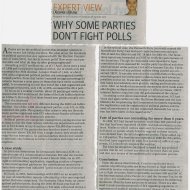Source
Live Mint
http://www.livemint.com/Opinion/PUraVcMxCi8cVJVOmf90CK/The-curious-case-of-parties-that-dont-fight-polls.html
Date
City
New Delhi


There are 1,698 political parties registered with EC, out of which only 464 contested the 2014 election. About 97% of the registered political parties, or 1,645, are unrecognized. It is interesting to note that out of the 1,645 registered and unrecognized parties, only 419 contested the 2014 poll. Photo: Hindustan Times
All eyes are on the political parties that emerged winners in the recent Lok Sabha elections. But what about the hundreds of political parties that stay registered with the Election Commission of India (ECI), but rarely contest polls? How many such parties exist and what do they do after getting registered?
According to ECI notifications, as of 17 April, there were a total of 1,698 political parties registered with it, out of which only 464 contested the 2014 election. A major chunk of 1,645, or about 97% of the registered political parties, are unrecognized (newly-formed parties, those that haven’t secured enough percentage of votes to become a state party or those that have never contested polls). It is interesting to note that out of the 1,645 registered and unrecognized parties, only 419, or 25%, contested the 2014 poll.
To focus on a smaller number, about 52 parties got newly registered after ECI announced the dates of the Lok Sabha elections on 5 March. But only 15 of these brand new parties actually contested the elections!
The scenario was not very different during the 2009 Lok Sabha election. Out of the 1,000 unrecognized parties, only 322, or 32%, contested the polls. The question that arises is why are there so many parties registered with ECI when three-fourths of them do not participate in the democratic process.
Political parties are completely exempt from paying income tax as long as they file their returns with the tax department and submit to ECI details of any donations above Rs.20,000 they receive annually. Even if the parties declare that they haven’t received any amount above Rs.20,000 from a single donor, they would still enjoy the tax exemption. So political parties that do not contest in elections can continue to collect donations and enjoy tax exemption.
A case study
In 2013, the Association for Democratic Reforms (ADR) obtained a copy of a communication between ECI and the Central Board of Direct Taxes (CBDT) dated 3 March 2006, via an RTI (right to information) application, regarding scrutiny of reports by two unrecognized parties on the contributions received by them; their reports had indicated “gross misuse of provisions of tax exemption”.
ECI had, in 2007, held meetings with CBDT on an enquiry in the case of contribution reports submitted by a few unrecognized parties that were suspicious. The Rashtriya Vikas Party, an unrecognized political party, during the 2005-06 fiscal year had declared cash donations amounting toRs.40 lakh; a firm had shown a contribution of Rs.2 crore in three transactions and the case was taken up for scrutiny by CBDT. The party was told to produce books of accounts and other documents to enable the assessing officer to deduce its income. As the party failed to produce these books, stating that they had been lost during transportation, CBDT disallowed tax exemption and initiated a penalty for concealment of income.
In the second case, the Parmarth Party (currently named the MatraBhakt Party) had declared contributions amounting to Rs.96.43 lakh for 2003-04 and Rs.47.28 lakh for 2004-05. The donations report was forwarded to CBDT to verify the genuineness of the donations. Though the donations were reported to have come from donors assessed for tax, the party’s political activities were surveyed under section 133A of the Income-Tax Act. There was no evidence of any political activity being carried out, observed CBDT. It was also seen that the contributions to the party were being used for investment in shares, loans and advances, jewellery and so on. It was also noticed from bank statements that loans and advances were given to trading and business concerns. After no books of accounts or documents were made available despite multiple visits to the party’s office premises, CBDT initiated further enquiries into the genuineness of the claims.
According to the above mentioned communication, ECI had “time and again written to Hon’ble Prime Minister and the Law Ministry for empowering the Commission in matters regulating the registration and de-registration of political parties and the need of amendment in the law connected therewith but no action has been taken in this regard so far”.
Fate of parties not contesting for more than 6 years
In 1999, ECI had issued notices to more than 200 political parties that had been registered till 1995, but had contested no elections. Parties to which notices were sent, but were returned undelivered, or parties which failed to respond to these notices, were deleted from the list of registered parties. These added up to 150 parties. The exercise was repeated in 2008 for 220 parties that had been registered till 2000. Due to lack of sufficient manpower, ECI could not complete the exercise.
The exercise should be continued to weed out any political parties that do not contest any election for more than six years and also as a means of strengthening the registration process.
Conclusion
From the above observations, it can be concluded that a number of political parties are being formed as legal entities to ostensibly receive voluntary contributions and evade taxes, but not to fight elections. More importantly, sections 29B and 29C of the Representation of the People Act, and the Income-Tax Act do not place any conditions on contesting of elections for collecting donations. Thus the laws are prone to misuse. There is a dire need to look into the proposals of ECI regarding regulation of registration of political parties to prevent misuse of the laws.
The author is a senior programme associate at the Association for Democratic Reforms (ADR).

